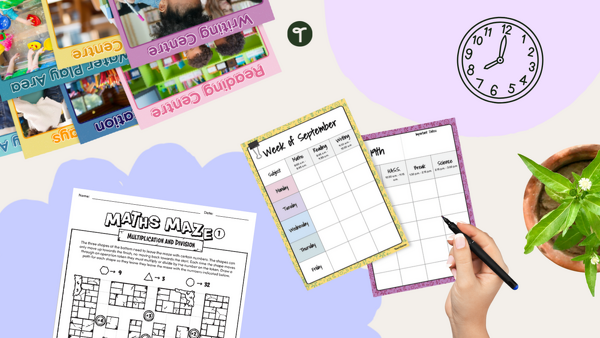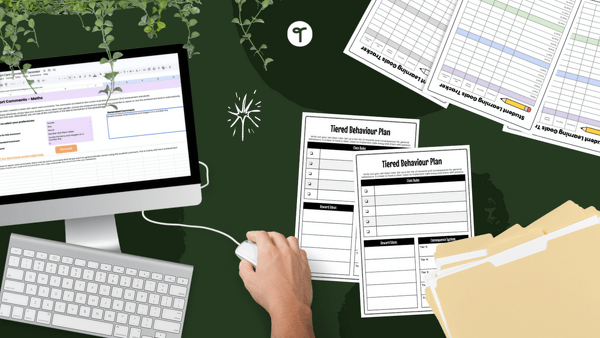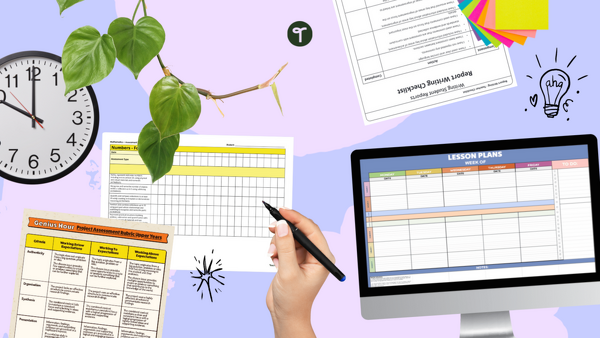At least twice a year, teachers get organised for a few late nights back at school running parent-teacher interviews. It’s a fantastic opportunity to sit down one-on-one with your students’ parents to discuss their child and how they are going socially, emotionally and academically.
We all know how crucial parent involvement and communication is in the classroom, and getting the most out of these short but crucial interviews is imperative to the smooth running of your classroom. So how do you make those short meetings in person really count? The teachers of the Teach Starter team have conducted hundreds (thousands?) of these interviews over the years, and we’ve put together this guide to help!
Read on for tips on how to prepare for your parent-teacher interviews, how to open the conversation with parents, what sort of questions parents are likely to ask and more! It’s important to note that some of these tips include actions that are taken during the year to ensure both the teacher and the parents get the most out of these interviews.
How to Prepare for Parent Teaching Interviews
1. Give Plenty of Notice
Whether you’re using old-fashioned paper organising or your school has an online booking system for conferences, make sure you send notice to your parents as far out from the scheduled dates as possible. Many parents have sibling interviews they need to work around, and many are also full-time workers. Providing them with ample time to get organised will ensure you get more parents attending.
If you have parent-teacher information nights at the beginning of the year, you might make a point to inform the parents that conferences would be held and let them know the dates to mark on their calendars ahead of time.
You can also add the dates to your class newsletter, or slip one of these pre-made reminder notes in with your students’ homework.
If you have people who did not sign up yet, a Google form is an easy way to offer the remaining slots to the other parents and carers for conference night.
2. Get Organised
The more organised you are, the better the interview will likely go.
Fill out your parent-teacher proforma and add it — along with any assessment or student work that you feel you will need — in a manilla folder labelled with the students’ name, so you can have it at hand. Parents will often ask about progresses in maths and English, so it’s helpful to have the latest reading assessment, a maths assessment and a writing sample in the folder — although what you include will vary, depending on year level and the individual student.
Sort your folders according to the order that parents are set to appear on your interview calendar, so it’s easy to pull out their son or daughter’s information.
3. Be Welcoming, and Plan the Environment
Put yourself in the parents’ shoes. They may be a little bit anxious about what might be discussed during the parent-teacher interview. Create an environment that is inviting, comfortable and welcoming. Although it’s common to set up a desk or table in between you and the parent(s), this creates a divide that can be off-putting. Setting up on the side of a table is more welcoming, and it will also make it easier for you to show any assessments or work as you can both read the pages at the same time.
When they arrive, ask how they are doing rather than immediately diving into the business at hand. You might even offer them a glass of water. Most of all, smile!
4. Open With a Question
Before talking about their child’s progress, ask the parents how they think their child is going. This will give you an instant look into the parental attitude and how realistic their understanding of their own student is! Knowing whether or not you’re all on the same page can help you choose your words.
It also gives parents a chance to share specific questions they might have, so you know what to address in the short time that you are together.
5. Remember the Sandwich Effect
Have you ever used the ‘compliment sandwich’ when sharing not-so-good news with a co-worker? It works for parent-teacher interviews too!
You may need to bring up tricky issues about a particular student’s behaviour, work ethic or level of skill, and the sandwich effect will help soften the blow. Basically, you start with something positive and encouraging, then you talk about the issue you need to discuss, followed by something else encouraging or positive.
This lets parents know that you see the positives in their children even while presenting them with your important concerns.
5. Set up a Play Station
As much as some schools advise parents to leave their children home on parent-teacher conference night, it’s not always possible for parents who cannot find (or maybe cannot afford) childcare.
Prepare a place in the classroom for kiddos to grab a book, play games or even just to colour. These colouring pages can all be printed and set aside for students for those days right before the holidays when half the class is already out:
If your school had decided on three-way student-led parent-teacher interviews this year, you may welcome students into the classroom but still find that younger siblings need diversions. A classroom section with activities to keep them busy will come in handy!
6. Use Evidence
When providing feedback during an interview, make sure you discuss both students’ strengths and weaknesses, providing details for parents. This is a bit like the sandwich concept, but it goes a bit deeper.
For example, if you are talking about writing, you may be discussing how the student enjoys writing and is improving all the time. If an area they may need to work on is ensuring they use adjectives to make their writing more interesting, show an example to help explain what you mean.
7. Anticipate Possible Questions
When planning for the parent-teacher interview, think about what each parent may want to talk about or possible questions they may ask so you can have your answers ready.
For example, if you know that Thomas has been having issues with his friends in the playground, and you have spoken to his parents before, they will likely want an update as to what you have noticed and ideas for some more possible strategies or solutions to help him. Make sure you are organised for these questions and have some ideas!
If you don’t know the answer to something, it’s OK to let the parents know you’re going to have to ask around or look it up.
Teach Starter Teacher Tip: Keep note pages handy (we love these DIY pages you can personalise!) to jot down questions so that you have them at hand after the parent-teacher conference and can do the necessary legwork to get answers.
8. Avoid Using Teacher Terms
As teachers, we love a good acronym, but different teacher terms that get thrown around can get really confusing for parents. Make sure that if you are going to speak in ‘teacher talk’ that you explain what the acronym or teacher term means. For example, you may mention WILF — make sure you explain that WILF stands for What I’m Looking For.
It may be helpful to print a copy of the school acronyms for parents!
9. Communicate All Year Round
Nothing that you discuss at parent-teacher interviews should be surprising to the parents.
If you have communicated effectively with parents and raised concerns as they happen, the parent-teacher conferences should be more of a follow-up to discuss how things are going. Being open and honest all year round will ensure that you have a good working relationship with the parents of your students.
Sending home weekly class newsletters can accomplish this and has the added benefit of making parents feel involved and included the whole year around. This means that the valuable parent-teacher interviews can ve spent talking more about the student, rather than what the whole class has been learning about or when an excursion will be scheduled.
10. Discuss Strategies
Discuss strategies, actions or goals that you want to set for their child with tips and actionable strategies for parents. This can go a long way toward making parents more receptive to any criticisms of their children as you’re not simply telling them what’s wrong. You’re helping them help their children.
If you are bringing up a social issue, discuss how are you going to help their child overcome this. If you are talking about an area academically that they are struggling with, discuss what are you doing in the classroom to help.
What are some strategies of things the parents can do at home to help their child? It’s all well and good to talk about these issues, but you need to provide the parents with ways to overcome them.
You might ask the parents, ‘What have you noticed in the past few weeks about the child’s learning and interests?’ and ‘How can we use these to boost their love for learning?’
11. Finish with a Positive
Make sure you finish with a positive about their child. Some parent-teacher interviews may get a little difficult if there are a few issues to bring up. But, always leave the parents with a positive thought as they leave the classroom.
Keep the communication going all year long! Explore more must-have parent-teacher communication resources!
Banner image via Shutterstock/Dusan Petkovic









Good job
This information was fantastic and very useful. Templates look great will use them. THANKS!!
Hi Toni, Thank you for your lovely comment. I am so glad you are enjoying our resources.